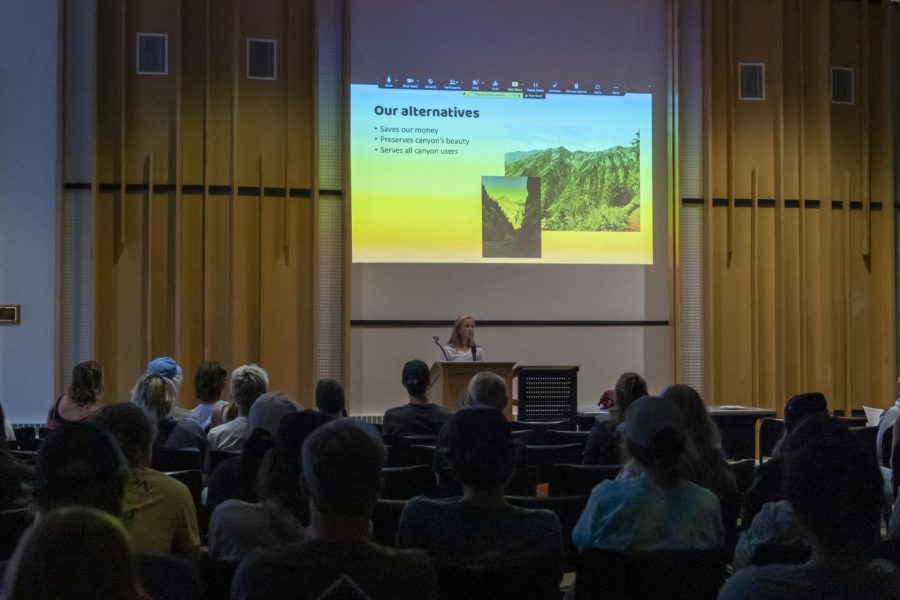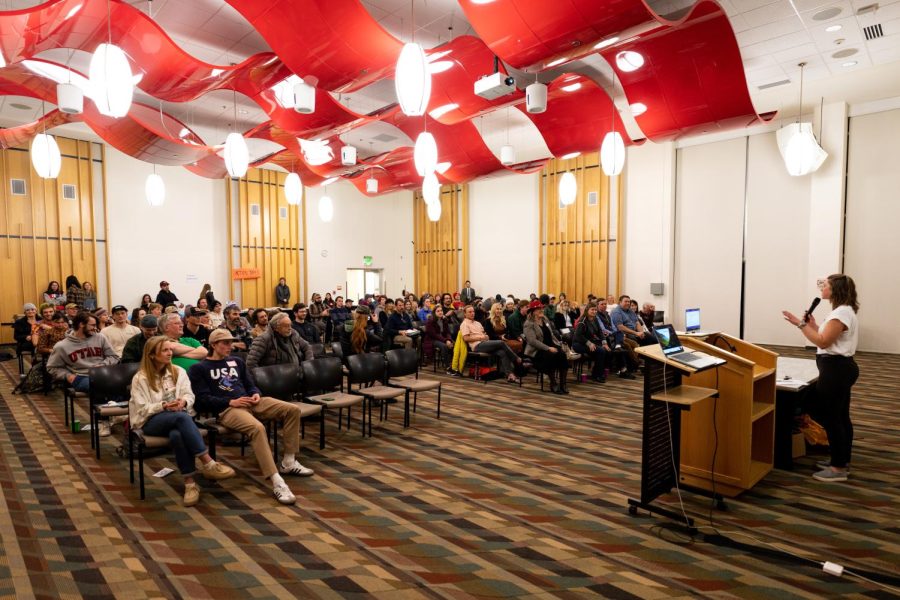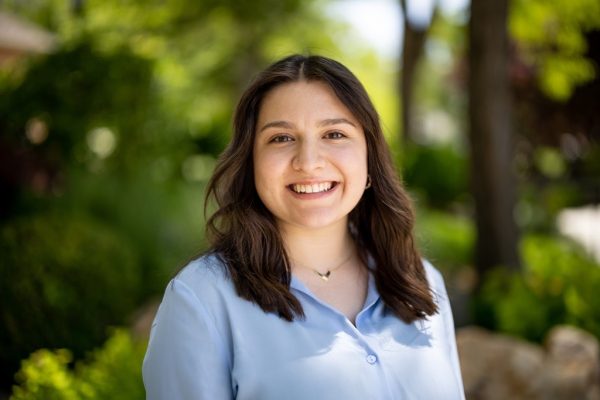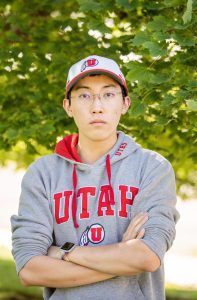Students for the Wasatch: Leading Student Advocacy Against Gondola B
Claudia Wiese speaks at the the Action Night held in the A. Ray Olpin Student Union in Salt Lake City on Feb. 6, 2023. (Photo by Xiangyao Tang | The Daily Utah Chronicle)
June 24, 2023
Graduating senior Claudia Wiese first heard about the idea to build the world’s longest gondola to solve traffic congestion in Little Cottonwood Canyon while she was driving down the canyon with her friend.
“I thought it was satire,” she said. “I thought that was a joke.”
Once she realized it wasn’t, Wiese felt “immediately distraught” and wanted to take action.
In recent years, traveling to and from ski resorts Alta and Snowbird increasingly involves getting stuck in traffic. UDOT has been exploring different solutions for years. Their recommended proposal of a $550 million gondola linking the Salt Lake Valley and adjoining Snowbird Ski Resort includes “the cost of tolling infrastructure, transit parking, adding snow sheds, addressing trailhead parking and widening Wasatch Boulevard, which are common to all alternatives.”
Wiese linked up with her friend Mallory Philliber, a University of Utah alum. And after reaching out to environmental groups across the valley, she was put in contact with Emily Pitsch, a biochemistry graduate student.
“We realized we really wanted to do something and I like to say, ‘It was a club at first sight,’” Wiese said.
Together, they formed Students for the Wasatch in November 2021. They scheduled their first event and two weeks later, way more people showed up than expected, said Wiese.
A year and a half later, the issue of the Utah Department of Transportation’s proposed Gondola B in Little Cottonwood Canyon is a topic of local importance and advocacy among students at the U.
“We had to turn people away,” she said. “We ran out of pizza so fast, and we were like, ‘Wow, this is a group of untapped students that could really be a voice in this conversation.’”
Last August, UDOT selected Gondola B as the preferred alternative to widening state Route 210. According to the UDOT website, this decision was made “as part of the Little Cottonwood Canyon Final Environmental Impact Statement (EIS) to improve transportation in the canyon.”
SFW opposes the gondola because the cost is fiscally irresponsible, and construction would affect the sensitive watershed. UDOT’s statement shows their proposals for the canyon aim to get more users into the canyon instead of reducing the number of cars on the road.
Student Impact
To educate students about the gondola issue and encourage involvement, SFW has hosted informational events and taught students how to write letters to lawmakers.
In February 2022, SFW took an electric bus from the Capitol up through LCC to show the efficiency and power of sustainable public transportation.
Brian Keller, a second-year biomedical engineering student and member of SFW, said the support he’s seen for the group has grown since it first started.
“The biggest change I’ve noticed is people are more enthusiastic with our involvement,” he said. “A year ago, I probably could have asked someone what they thought of the issue and they wouldn’t have had a solid answer, and now they maybe have more of an opinion on it.”
Last September, SFW held an event at the Union where they invited Michael Maughan, general manager of Alta Ski Area, to have a collaborative discussion about solutions to the traffic problem in Little Cottonwood Canyon. At the event, Wiese said, “Tonight is really exciting because the conversation has never happened in the public, where anti-gondola speaks to pro-gondola and we try to find common ground.”

SFW hosted a similar event in December and had Salt Lake County Deputy Mayor Catherine Kanter present “common-sense solutions” to the traffic problem. These included incentivizing carpooling, investing in an enhanced electric bus system, ski parking management, tolling, and implementing and enforcing traction device requirements.
Wiese and Keller said they have encouraged students to get more involved in local politics and make public comments, as well as guided students on how to talk to local politicians, which is a hard but valuable skill to learn.
“Often you kind of get brushed aside [by politicians] or they talk in circles,” Wiese said.
Despite the difficulties in talking with local lawmakers, Keller said people in the community at large are more enthusiastic about the movement, especially since the group is completely student-run.
“People … beyond the University of Utah are really kind of stoked on our group because they’re like, ‘Oh, you guys are like the young voices [on this issue],'” he said.
Growth
Two years ago, Keller didn’t know anything about the gondola, but joining SFW helped him become more aware, which he hopes is the case for other students involved in the group.
“I’m very passionate about trying to preserve the natural beauty of the canyon,” Keller said.
And over time, he thinks SFW has played a part in spreading awareness about this issue to the campus and beyond.
“It almost feels like people are taking the gondola more seriously at the same pace,” he said. “They’re taking us more seriously.”
Wiese added she’s consistently seeing new people come to events and reaching out, as well as building a valuable network of connections.
“I think our outreach has really spread and we’ve become a name that people recognize,” she said.
As SFW continues to grow and make an impact, Wiese said their ambition and goal to stop the construction of the gondola at all costs will always stay the same.
Keller recalled going to his first meeting and seeing five or six people.
“Now, we’ll consistently have like a dozen people at some of our meetings,” he said. “We’ve consistently pulled more and more every time we’ve hosted an event. It’s really cool to see how more people are getting involved with the issue as they become more aware of it.”
Wiese said building connections with other advocacy groups and local officials has been another part of SFW’s growth and outreach.
“We’ve grown into a very respectable group,” Wiese said. “And we do believe that mutual respect, and working together will ultimately be what will help us find a solution.”
Dreaming Big
Wiese is graduating this spring with degrees in biology, environmental and sustainability studies, and Latin American studies.
She said it’ll be sad and a little bit scary to leave SFW behind because she can’t control how it grows.
“It’s ultimately up to them where it goes,” Wiese said. “I will definitely stay engaged with the issue through other organizations and definitely through policy work. I can see a future for myself in environmental advocacy, conjoined with politics.”
Keller said the gondola project is important, and besides hosting events and providing information and resources to the public, there is not a lot of concrete work that can be done at this moment.
“The biggest thing we’re doing right now is trying to convince … the Wasatch Front Regional Council to remove a gondola as a recommendation in their yearly recommended transportation plan,” he said.
The Wasatch Front Regional Council is an entity that recommends and develops transportation plans.
According to SFW’s Instagram, UDOT needs the gondola in the WFRC’s plan to choose it as a final recommendation.
Keller said SFW will continue to provide outlets and information so people’s voices can be heard. By directing them into positive outlets, including encouraging public transportation, carpooling and writing letters to their representatives he said SFW can make real impacts.
Wiese is hopeful for the future and proud of the time she’s had with SFW.
“Ultimately, what I wanted was to make an impact,” she said. “I think we’ve been a big part of … stopping the gondola, at least for now, and really promoting what it means to create transportation. I feel like there’s so much I wanted to do, and obviously, I wasn’t able to do it all — that’s part of the whole goal of dreaming big — but in the end, very proud and excited to see where other people bring it.”









